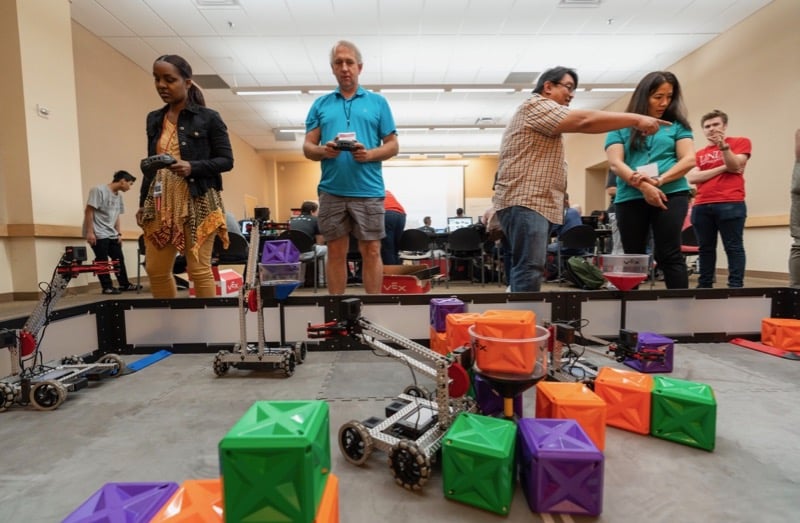Reno, Nev. (Feb. 27, 2020) – Robotics clubs and competitions have become popular in many Nevada middle and high schools in recent years, but opportunities for participation at the elementary school level have so far been limited. This is set to change, thanks to a new grant from Nevada Gold Mines to the Nevada Robotics program, led by the Desert Research Institute (DRI).
The $100,000 grant will support elementary school teacher participation in two upcoming sessions of the 2020 Summer Robotics Academy of Nevada, an annual 4-day training that is co-sponsored by Tesla.
“We’re thrilled to be able to expand our robotics programming to Nevada’s elementary school teachers this year, with this support from Nevada Gold Mines,” said A.J. Long, head of the Nevada Robotics program at DRI. “Introducing students to the fun and challenge of robotics at an early age will help us immensely in strengthening the STEM workforce pipeline across the state.”
The Nevada Robotics program, launched in 2019, introduces Nevada teachers to the engineering and robotics concepts needed to build and operate automated and remote-controlled robots with groups of students. Last summer, with support from Tesla’s K-12 Education Investment Fund, DRI partnered with the University of Nevada, Reno (UNR) and University of Nevada, Las Vegas (UNLV) to offer free training courses in robotics to more than 200 middle and high school teachers from across the state. Four additional trainings in the fall brought the total number of trained teachers to just over 400.

The Nevada Robotics program introduces Nevada teachers to the engineering and robotics concepts needed to build and operate automated and remote-controlled robots.
Following the robotics workshops, teachers are prepared to develop competitive robotics teams at their schools. In the past year, with support from Tesla and Nevada Gold Mines, the number of competitive robotics teams in Nevada has increased by 43 percent, now totaling 672 teams and reaching more than 6,000 students. This spring, for the first time, Vex IQ robotics teams from five schools in Las Vegas, Henderson, and Ely have qualified for the VEX IQ Challenge Robotics World Championship in Louisville, Kentucky.
“Robotics is an amazing way to spark a lifelong interest in STEM (science, technology, engineering and mathematics), teamwork, and creative problem solving for students of all ages,” said Long. “Since launching last year, we’ve seen a huge amount of interest in robotics from teachers, students, and schools across the state.”
The 2020 Summer Robotics Academy of Nevada, open to elementary, middle and high school teachers, will be held in Las Vegas on May 26-29, 2020 at Cimarron-Memorial High School, and in Reno on June 16-19, 2020 at Damonte Ranch High School. The first three days of each training are designed for teachers who are new to robotics; the fourth day will be open to participants of all coaching and teaching levels.
Nevada teachers can attend the Summer Robotics Academy at no cost. Rookie coaches are eligible for travel and accommodation stipends as well as and continuing education credits. Following completion of the training, teachers who agree to start a new robotics team at their school are eligible for a free robotics kit, thanks to program sponsors, Tesla and Nevada Gold Mines.
With this grant, Nevada Gold Mines joins Tesla as a founding partner in Nevada Robotics. Melissa Schultz from Nevada Gold Mines will serve on the program’s advisory council, along with representatives from UNR, the Economic Development Authority of Western Nevada (EDAWN), the REC Foundation, PBS Reno, Clark County Schools, UNLV, Washoe County School District, FIRST Nevada, and Tesla.
For more information about the Nevada Robotics program, please visit: www.dri.edu/nevadarobotics
For teachers who are interested in attending the summer Robotics Academy of Nevada Teacher Trainings, please visit: https://forms.gle/CcsRqHpGd6dDW11Z9. Registration opens March 2nd, 2020.
###
The Desert Research Institute (DRI) is a recognized world leader in basic and applied interdisciplinary research. Committed to scientific excellence and integrity, DRI faculty, students, and staff have developed scientific knowledge and innovative technologies in research projects around the globe. Since 1959, DRI’s research has advanced scientific knowledge, supported Nevada’s diversifying economy, provided science-based educational opportunities, and informed policy makers, business leaders, and community members. With campuses in Reno and Las Vegas, DRI is one of eight institutions in the Nevada System of Higher Education.


